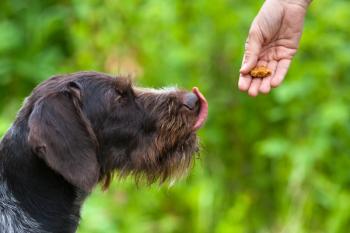
Editors' Guest: Are you current on your vaccines?
On March 1, 2006, the American Animal Hospital Association (AAHA) released the second iteration of the Canine Vaccine Guidelines, which includes a number of important updates and additions to the initial version published just three years ago.
On March 1, 2006, the American Animal Hospital Association (AAHA) released the second iteration of the Canine Vaccine Guidelines, which includes a number of important updates and additions to the initial version published just three years ago. I strongly encourage all veterinarians practicing companion-animal medicine today to review this important document (
These guidelines were not written to provide a universal vaccination protocol for all dogs. In fact, nothing like that exists nor should it. The guidelines were developed to provide recommendations, based on the most current data available, that individual practices can use in developing rational vaccination protocols. The need for these guidelines is clear: With about 26 separate types of canine vaccine available in the United States today, represented by nearly 100 proprietary products—and more expected this year—staying fully informed in a perpetually changing market is daunting, to say the least.
Richard B. Ford, DVM, MS, DACVIM, DACVPM (honorary)
The new guidelines are divided into two parts: Part 1, important updates on vaccination issues in general practice, and Part 2, principles of vaccinating dogs in the animal shelter environment.
Updates on vaccination issues
Initial puppy and initial adult vaccination recommendations are listed for all vaccine types licensed for dogs in the United States (see Table 1 in the guidelines). Revaccination (booster) recommendations are also listed along with comments on whether a particular vaccine type is recommended as core or noncore (optional) or is not recommended. This table summarizes the AAHA Canine Vaccine Task Force recommendations—it's worth the read!
You'll also find a section on new vaccine technologies. Alternatives to traditional killed and modified live (avirulent live) vaccines are now available as several recombinant products have been licensed for use in dogs, cats, horses, wildlife (rabies), and people. And with DNA vaccines on the horizon in veterinary medicine, it becomes increasingly important for veterinarians to understand the immunologic principles behind the immunologic specificity and safety of recombinant vaccines.
The new guidelines also address the role of serologic testing in assessing immunity after vaccination. This section contains important facts pertaining to the application and interpretation of serologic testing.
An updated Vaccine Adverse Events section reflects current recommendations on recognizing and reporting adverse reactions associated with vaccination. Guidance on when and how to report is provided. Keep in mind that, in veterinary medicine, no national vaccine adverse event database exists. While veterinarians are always encouraged to report known or suspected adverse vaccine reactions directly to the manufacturer, a manufacturer is not required to divulge adverse event information received from other veterinarians on similar reactions caused by the same product.
Key issues pertaining to a veterinarian's potential liability associated with vaccination (either injury or failure to immunize) have also been updated. This section, titled "Vaccination from a Medicolegal Perspective," reviews critical terms such as negligence, malpractice, and informed consent as they pertain to vaccination.
The last section of Part 1 addresses vaccination in the context of individualized care. Both fact and philosophy are included. While the AAHA Canine Vaccine Task Force supports the principle of providing an annual examination for dogs, it emphasizes that annual vaccination alone does not constitute a comprehensive wellness program.
Vaccinating dogs in shelters
This entirely new section is intended for veterinarians who specifically work in shelter medicine as well as those who may serve local shelters in an advisory capacity. Included are a table that lists which vaccines are recommended and which are not and vaccination recommendations for circumstances unique to the shelter environment involving pregnant dogs, sick dogs, dogs with known vaccination histories, and dogs held long-term.
As new vaccines and new information on existing vaccines become available, the AAHA Canine Vaccine Guidelines will be updated. Once the task force reviews them, timely vaccine updates will be posted directly at
The 11-member AAHA Canine Vaccine Task Force is composed of practitioners, immunologists, and internists who have volunteered their time to review the current literature on vaccines and to make objective recommendations on the efficacy and safety of and the indications for vaccination of dogs seen in general practice and presented to and housed within an animal shelter. The members of the task force receive no compensation for this work, nor are their efforts sponsored or funded by any vaccine manufacturer.
Richard B. Ford, DVM, MS, DACVIM, DACVPM (honorary), is professor of internal medicine at North Carolina State University's College of Veterinary Medicine. He was a coauthor of both the 2003 and the 2006 AAHA Canine Vaccine Guidelines.
Newsletter
From exam room tips to practice management insights, get trusted veterinary news delivered straight to your inbox—subscribe to dvm360.






